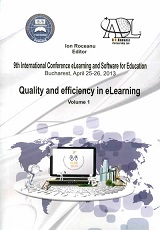MOTIVATIONAL FACTORS FOR ENGAGING STUDENTS WITH DIGITAL CONTENT– A CASE STUDY
MOTIVATIONAL FACTORS FOR ENGAGING STUDENTS WITH DIGITAL CONTENT– A CASE STUDY
Author(s): Silvia Făt, Petre BotnariucSubject(s): Education
Published by: Carol I National Defence University Publishing House
Keywords: learning skills; learning style; e-learning; teacher training
Summary/Abstract: The article summarises the main motives and drawbacks of students enrolled in a face to face semester course for / from participating in one’ learning platform provided as a supplementary support to the face to face classes, namely Education Psychology and Pedagogy courses addressed to students from several faculties subscribed in the Psycho-pedagogical training module. The e’learning platform was implemented on a moodle solution hosted by the Institute of Education Sciences – Dep. of Educational Management and Counselling through the Distance Education Centre – training.ise.ro. The instructional design is analysed and variables of formatting the platform explored (type of organisation of the course, planning of the study time, online and offline data processing tools, personal variables, organisation of the content and activity and resources used in the course, student – student, student - content and student - tutor interaction, access and familiarity with the platform) in order to facilitate a higher involvement of students in online activities and engagement with the proposed digital content through the different moodle facilities. The student preferences for different digital content formats are presented and their overall final performance assessed against the participation level in the online platform. Alternative solutions are suggested to meet the students learning styles and different experiences with e’learning environments providing illustrative samples of student work. The effectiveness of different knowledge testing solutions is explored including standalone offline based ones like behavioural self designed assessment spread-sheets versus online moodle based quizzes. The methods used include students’ opinion surveys and online data analysis from both the moodle platform and other surveying solutions.
Journal: Conference proceedings of »eLearning and Software for Education« (eLSE)
- Issue Year: 9/2013
- Issue No: 01
- Page Range: 232-237
- Page Count: 6
- Language: English

